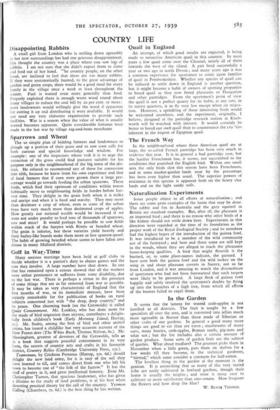Sparrows and Wheat
The so simple plan of bidding farmers and landowners to plough up a portion of their grass and to sow corn calls for both curious and special knowledge and wisdom. For example: one of the inspectors whose task it is to urge the extinction of the grass could find pastures suitable for his purpose only in the neighbourhood of the big town of the dis- trict. He refused to recommend any of these for conversion into tilth, because he knew from his own experience and that of local farmers that if corn were grown there a large per- centage would go towards feeding the urban sparrows. These birds, which find their optimum of conditions within towns habitually move to neighbouring fields in hordes before har- vest time. They delight in the grain both when it is milky and unripe and when it is hard and starchy. They may more than decimate a crop of wheat, even as some of the urban boys have very much more than decimated crops of apples. How greatly our national wealth would be increased if we were not under penalty to feed tens of thousands of sparrows, rats and mice! It would perhaps be possible to sow fields within reach of the harpies with Rivets or bearded wheat. The grain is inferior, but these varieties yield heavily and their barley-like beards make them more or less sparrow-proof. The habit of growing bearded wheat seems to have fallen into disuse in many Midland districts.








































 Previous page
Previous page